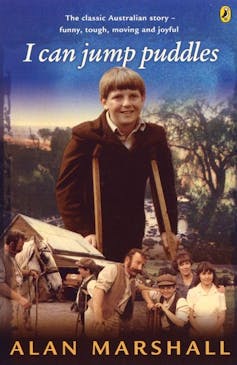‘My greatest handicap was the attitude of normal people.’ Alan Marshall’s artful polio memoir, I Can Jump Puddles, turns 70
- Written by Amanda Tink, Postdoctoral Research Fellow, UniSA Creative, University of South Australia

With vaccine sceptic Robert F. Kennedy Jr as United States Health Secretary and an outbreak in Papua New Guinea last month, polio – largely eliminated in most of the world – has been back in the news. It’s a potent sign of why vaccines are important. Mass polio vaccination began in Australia in 1956. Our last polio outbreak was in 1961 and Australia was declared polio-free in 2000.
Australian disabled author Alan Marshall contracted polio in 1908, when he was six. In 2025, it is 70 years since he published his fictionalised memoir, I Can Jump Puddles: often framed by nondisabled people as an inspirational story of a boy overcoming polio. However, it was much more complex than that.
In 1955, Marshall had already been an author for 20 years. Using his writer’s toolbox, he carefully crafted his memoir to reflect the truth as he felt it, and key messages he was passionate about – including the importance of encouraging disabled children to take risks and learn. This influenced what he put in and left out.
A staple of many Australian school reading lists for decades, Puddles was translated into 30 languages, made into a movie (in Czechoslovakia) in 1971 and an ABC TV miniseries in Australia in 1981. Marshall narrated the text for ABC radio, too.
A 1900s childhood with polio
Marshall would continue to write for another 20 years, but Puddles was his most successful book by far. In the second half of the 20th century, he was one of Australia’s most famous disabled authors, both at home and abroad.
Puddles recounts Marshall’s childhood from when he contracted polio. We now know polio is a highly infectious condition that spreads through respiratory droplets, or faeces. We know some who catch polio will experience no symptoms, while others will be paralysed. And we know polio can be fatal if the paralysis effects the muscles needed for breathing. However, when Marshall was growing up in the early 1900s, polio had only recently been discovered in Australia.
Back then, it was called infantile paralysis. People did not understand how it was spread. Treatments were experimental, and there was no vaccine. For many children, including Marshall, it meant a long stay in hospital.
Ultimately, Marshall’s right leg was completely paralysed and his left leg was partially paralysed. So began his life on crutches. Once he was competent walking with them, he returned to his family in rural Victoria, and then to school. There, according to Puddles, he was an average student with both best friends and bullies, growing up in a small community who accepted him as he was.
A memoir of truth, not fact
Puddles is often regarded as an account of Marshall’s early life exactly as it occurred. However, as a skilled author, Marshall used everything he had learned in 20 years of being a writer to create a compelling narrative that represented his experience of childhood.



















